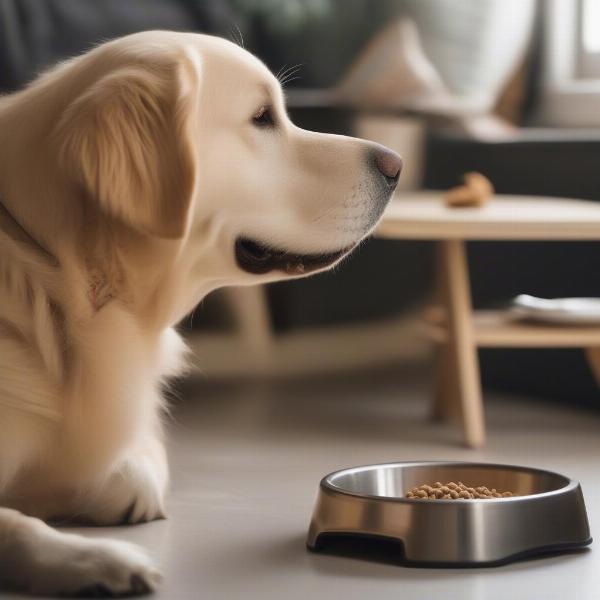Large dog food isn’t just about bigger kibble; it’s about providing tailored nutrition for the unique needs of your large breed companion. From giant breeds like Great Danes to the powerfully built Rottweiler, these dogs have specific dietary requirements that must be met to ensure optimal health and longevity. Choosing the right large dog food is a crucial decision that directly impacts their joint health, muscle development, and overall well-being.
Understanding the Nutritional Needs of Large Breed Dogs
Large breed dogs have different nutritional needs compared to their smaller counterparts. Their rapid growth, larger bone structure, and predisposition to certain health issues require a carefully balanced diet. Large dog food formulations often contain controlled levels of calcium and phosphorus to support healthy bone development, especially during puppyhood. This helps prevent skeletal issues like hip and elbow dysplasia, common in larger breeds. Additionally, glucosamine and chondroitin are often added to support joint health and mobility.
 Large Dog Eating Kibble from a Bowl
Large Dog Eating Kibble from a Bowl
Protein is another essential component of large dog food, providing the building blocks for strong muscles and maintaining a healthy body condition. Look for high-quality protein sources like chicken, beef, lamb, or fish. However, excessive protein can also put a strain on the kidneys, so finding the right balance is essential. Furthermore, large dog food often contains specific levels of fiber to aid digestion and prevent bloat, a serious condition that can be life-threatening for large breeds.
Choosing the Right Large Dog Food: Key Factors to Consider
Selecting the appropriate large dog food involves considering several factors. Your dog’s age, activity level, and any underlying health conditions all play a role in determining the optimal nutritional profile. Puppies, for instance, require a higher calorie and protein content to support their rapid growth, while senior dogs may benefit from a lower calorie formula with added joint support. large dog food container
Always check the ingredient list and avoid foods with fillers, artificial colors, and flavors. Opt for whole food ingredients and clearly identified protein sources. Consulting your veterinarian is also highly recommended, especially if your dog has any specific dietary needs or health concerns. They can provide personalized recommendations based on your dog’s individual requirements.
Feeding Your Large Breed Dog: Portion Control and Frequency
Even the best large dog food won’t benefit your companion if not fed correctly. Overfeeding can lead to obesity, which puts additional stress on their joints and increases the risk of various health problems. Follow the feeding guidelines on the food packaging and adjust the portions based on your dog’s activity level and body condition. canidae large breed dog food
How much should I feed my large breed dog?
The amount of large dog food you should feed your dog depends on their age, weight, activity level, and the specific food you’re using. Always check the feeding guidelines on the food packaging.
How often should I feed my large breed dog?
Most adult large breed dogs do well being fed twice a day, once in the morning and once in the evening. Puppies may require more frequent meals.
Dividing the daily food allowance into two meals can also help prevent bloat. Furthermore, avoid exercising your dog immediately before or after meals. large dog food mat
Conclusion: Investing in Your Large Dog’s Health with the Right Food
Choosing the right large dog food is a fundamental aspect of responsible pet ownership. By understanding their specific nutritional needs and carefully selecting a high-quality food, you are investing in their long-term health and happiness. Remember to consult your veterinarian for personalized advice and always monitor your dog’s body condition and overall well-being. With the right nutrition, your gentle giant can thrive and enjoy a long, active life.
FAQ
- What is the best large dog food for joint health? Look for foods with glucosamine, chondroitin, and omega-3 fatty acids.
- How can I prevent bloat in my large breed dog? Feed smaller, more frequent meals and avoid vigorous exercise before or after eating.
- Is grain-free food better for large breed dogs? Not necessarily. Consult your veterinarian for advice specific to your dog.
- What are the signs of food allergies in large dogs? Itching, skin irritation, gastrointestinal upset, and ear infections.
- Can I feed my large breed puppy adult dog food? No, puppies require a specially formulated puppy food for their growth and development.
- How do I transition my large dog to a new food? Gradually introduce the new food over several days, mixing it with the old food.
- What should I do if my large dog is overweight? Consult your veterinarian for a weight management plan and dietary recommendations.
ILM Dog is a leading online resource dedicated to providing expert advice on all aspects of dog care, from breed selection to senior care. We offer practical, reliable information to help dog owners worldwide make informed decisions about their furry companions. Whether you’re a seasoned dog owner or just starting your journey, ILM Dog is here to support you every step of the way. From nutrition and training to health and wellness, we cover it all. Learn more about how to provide the best possible care for your canine friend by contacting us at [email protected] or calling +44 20-3965-8624. ILM Dog is your trusted partner in dog ownership.